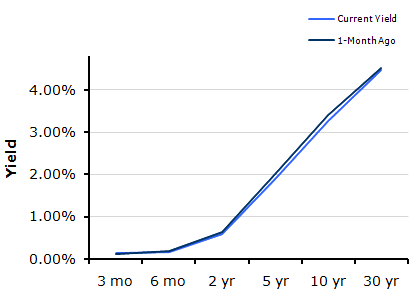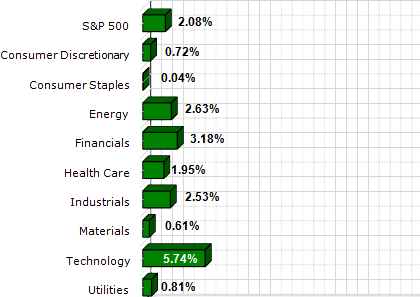
Market Commentary by Scott J. Brown, Ph.D., Chief Economist

Scott J. Brown Ph.D., Chief Economist Raymond James Investment Services
The economic data remained consistent with a moderate pace of economic expansion. Retail sales rose 0.6% in December, up 0.5% excluding autos, boosted somewhat by higher gasoline prices. Industrial production rose 0.8%, aided by colder temperatures (utility output up 4.3%, manufacturing up 0.4%). As anticipated, headline inflation figures were boosted by higher energy prices in December and the impact was magnified by the season adjustment. The Consumer Price Index rose 1.5% in the 12 months ending in December, up just 0.8% ex-food & energy (vs. the Federal Reserve’s implicit goal of around 2%). Jobless claims jumped, but the figures are normally choppy during this time of year (due to difficulties in the seasonal adjustment).
Investors reacted to the mix of economic data and kept an eye on the European debt situation.
Next week, there are a handful of potentially market-moving data releases. However, residential construction and home sales figures should not be important, as December is not a big month for housing activity (the bigger test will come in the spring). The LEI should post another strong gain.
Indices
| Last | Last Week | YTD return % | |
| DJIA | 11731.9 | 11697.31 | 1.33% |
| NASDAQ | 2735.29 | 2709.89 | 3.11% |
| S&P 500 | 1283.76 | 1273.85 | 2.08% |
| MSCI EAFE | 1692.31 | 1648.65 | 2.05% |
| Russell 2000 | 800.65 | 791.42 | 2.17% |
Consumer Money Rates
| Last | 1-year ago | |
| Prime Rate | 3.25 | 3.25 |
| Fed Funds | 0.18 | 0.11 |
| 30-year mortgage | 4.76 | 5.23 |
Currencies
| Last | 1-year ago | |
| Dollars per British Pound | 1.586 | 1.628 |
| Dollars per Euro | 1.336 | 1.450 |
| Japanese Yen per Dollar | 82.710 | 91.370 |
| Canadian Dollars per Dollar | 0.987 | 1.031 |
| Mexican Peso per Dollar | 12.115 | 12.755 |
Commodities
| Last | 1-year ago | |
| Crude Oil | 91.40 | 79.65 |
| Gold | 1384.47 | 1133.47 |
Bond Rates
| Last | 1-month ago | |
| 2-year treasury | 0.58 | 0.64 |
| 10-year treasury | 3.27 | 3.40 |
| 10-year municipal (TEY) | 5.26 | 4.97 |
Treasury Yield Curve – 1/14/2011

S&P Sector Performance (YTD) – 1/14/2011

Economic Calendar
| January 17th | — | Martin Luther King, Jr. Holiday (markets closed) |
| January 18th | — | Empire State Manufacturing Index (January) Homebuilder Sentiment (January) |
| January 19th | — | Building Permits, Housing Starts (December) |
| January 20th | — | Jobless Claims (week ending January 15th) Existing Home Sales (December) Leading Economic Indicators (December) Philadelphia Fed Index (January) |
| January 25th/26th | — | FOMC Meeting |
| January 28th | — | Real GDP (4Q11, advance estimate) |
| February 2nd | — | State of the Union Address (also, Groundhog’s Day) |
Important Disclosures
Past performance is not a guarantee of future results. There are special risks involved with global investing related to market and currency fluctuations, economic and political instability, and different financial accounting standards. The above material has been obtained from sources considered reliable, but we do not guarantee that it is accurate or complete. There is no assurance that any trends mentioned will continue in the future. While interest on municipal bonds is generally exempt from federal income tax, it may be subject to the federal alternative minimum tax, state or local taxes. In addition, certain municipal bonds (such as Build America Bonds) are issued without a federal tax exemption, which subjects the related interest income to federal income tax. Investing involves risk and investors may incur a profit or a loss.
US government bonds and treasury bills are guaranteed by the US government and, if held to maturity, offer a fixed rate of return and guaranteed principal value. US government bonds are issued and guaranteed as to the timely payment of principal and interest by the federal government. Treasury bills are certificates reflecting short-term (less than one year) obligations of the US government.
Commodities trading is generally considered speculative because of the significant potential for investment loss. Markets for commodities are likely to be volatile and there may be sharp price fluctuations even during periods when prices overall are rising. Specific sector investing can be subject to different and greater risks than more diversified investments.
Tax Equiv Muni yields (TEY) assume a 35% tax rate on triple-A rated, tax-exempt insured revenue bonds.
![]() Material prepared by Raymond James for use by its financial advisors.
Material prepared by Raymond James for use by its financial advisors.
The information contained herein has been obtained from sources considered reliable, but we do not guarantee that the foregoing material is accurate or complete. Data source: Bloomberg, as of close of business January 13th, 2010.
©2010 Raymond James Financial Services, Inc. member FINRA / SIPC.


